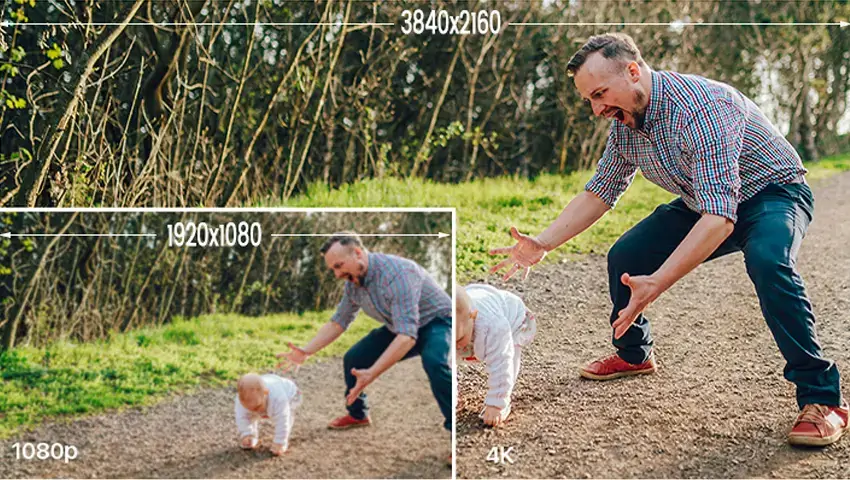When it comes to security cameras, the difference between 1080p and 4K is like comparing standard lenses to high-definition ones. Both offer clear views, but 4K brings out finer details that 1080p may miss. Imagine zooming in to catch a license plate at the far end of your driveway or identifying subtle features of a face in sharp clarity. As security threats evolve, so does the technology that protects us. So, which resolution should you choose—4K or 1080p? Let’s explore the key differences to help you make the right decision.
Contents
What Is 1080p?
1080p, known as Full HD, provides a resolution of 1920×1080 pixels. This has been the standard for many years in both residential and commercial surveillance systems. It offers good image clarity, particularly in smaller or medium-sized areas where high detail may not be crucial. Despite being an older standard, 1080p is still widely used due to its balance of quality and affordability.
What Is 4K
4K, or Ultra HD, delivers a resolution of 3840×2160 pixels, which is four times the pixel count of 1080p. This higher pixel density means you can zoom in on important details like faces or license plates without losing clarity. 4K is quickly becoming the new standard for high-end security systems, particularly for larger spaces or applications where fine detail is essential.
4K vs 1080p: Key Differences
1. Image Clarity
The most notable difference between 4K and 1080p cameras is in image clarity. With 4K, you get crystal-clear footage that retains detail even when zooming in. This makes it ideal for situations where facial recognition or license plate identification is required. In comparison, 1080p cameras provide decent clarity but may lose finer details, especially in larger spaces.
2. Field of View
Higher resolution typically translates to a wider field of view. This means that with a 4K camera, you can cover a broader area with fewer cameras, reducing the number of devices needed. In contrast, 1080p cameras might require additional units to achieve the same coverage, making them less efficient for larger areas.
3. Night Vision Performance
Both 1080p and 4K cameras offer night vision capabilities, but 4K cameras tend to perform better in low-light conditions. Thanks to more advanced sensors and a higher pixel count, 4K cameras provide clearer images in the dark. This is crucial for 24/7 surveillance in environments with poor lighting.
4. Storage Requirements
One trade-off of using 4K cameras is the increased storage requirement. A 4K video file is significantly larger than a 1080p file, meaning you’ll need more hard drive space or cloud storage. However, modern compression technologies like H.265 can help reduce file sizes without compromising video quality.
5. Bandwidth Consumption
Similarly, 4K cameras demand more bandwidth for streaming and recording footage. If you have limited internet bandwidth, this could be a consideration. 1080p cameras are much more efficient in this regard, requiring less bandwidth and thus offering smoother streaming in areas with slower internet speeds.
6. Cost and Availability
4K systems are generally more expensive than 1080p setups. This applies not only to the cameras themselves but also to the increased storage and bandwidth needs. However, the cost of 4K technology is gradually decreasing, making it more accessible for both home and business use.
Which Resolution Should You Choose?
1. Best for Home Security
If you’re securing a medium-sized home or apartment, 1080p cameras are usually sufficient, offering clear footage at an affordable price. However, if you need to capture fine details—such as facial features or license plates—especially at a distance, a 4K camera may be a better choice.
2. Best for Businesses
For businesses with larger premises, 4K systems are the way to go. Not only do they provide superior image clarity, but the wider field of view means you may need fewer cameras to cover the same area, reducing overall costs in the long run.
3. Best for Large Areas
For large outdoor areas, such as farms, parking lots, or commercial spaces, 4K cameras are ideal. They excel in capturing detailed footage from far away and perform better in low-light conditions, making them perfect for extensive monitoring.
Recommended 4K and 1080p Security Camera Systems
Choosing between 4K and 1080p security cameras depends on your specific needs. Below are some typical scenarios and recommendations for when to choose each type of camera:
1. When to Choose 4K Security Cameras:
4K cameras are best suited for situations where clarity and detail are critical. They’re ideal for:
- Large outdoor spaces: Farms, parking lots, and warehouses benefit from the wider field of view and better detail.
- Business surveillance: They help spot shoplifters or identify employees in retail or office environments.
- Critical detail capture: Perfect for entry points where facial recognition or license plate reading is important.
C296 - Pan Tilt IP Security Cameras
- 4K Ultra HD/5MP Super HD
- Starlight Color Night Vision
- Pan & Tilt
- PoE/WiFi Connection
- Light & Siren Alarm
- Upgraded AI-Powered Detection
- 2-Way Audio
C225 - 4K POE Surveillance Cameras Security Monitor Systems
- 4K Ultra HD
- Smart Person/Vehicle Detection
- Customize Detection Zone
- Starlight Night Vision
- 24/7 Video & Audio Recording
- Access Remotely & Flexibly
- Two Way Audio
2. When to Choose 1080p Security Cameras:
1080p cameras are an excellent choice for smaller spaces where high detail isn’t as important. They’re suitable for:
- Small to medium-sized homes: Perfect for indoor or outdoor home surveillance.
- Budget-friendly setups: Ideal for users who need reliable performance without the higher cost of 4K.
- Limited storage or bandwidth environments: Best for areas where saving space and internet bandwidth is crucial.
FAQs
1. Does 4K really make a difference in security cameras?
Yes, especially for large areas or situations where detailed footage, such as license plate or face recognition, is needed.
2. Is 1080p still good enough for home security?
For small to medium-sized homes, 1080p provides sufficient image quality at an affordable price.
3. Does 4K require a lot of storage and bandwidth?
Yes, 4K videos are much larger in size and consume more bandwidth, but modern compression technology can help mitigate this.
Conclusion
The decision between 1080p and 4K depends on your individual requirements. If you’re looking for affordability and decent quality for most home setups, 1080p cameras are a solid choice. On the other hand, if you need the highest clarity, better low-light performance, and wider coverage for larger areas or businesses, 4K cameras offer superior performance. In the end, it comes down to balancing your security needs, available bandwidth, and budget.

